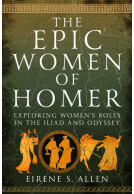Catiline, Rebel of the Roman Republic (Hardback)
The Life and Conspiracy of Lucius Sergius Catilina
Imprint: Pen & Sword History
Pages: 232
ISBN: 9781399067898
Published: 4th August 2023
(click here for international delivery rates)
Order within the next 5 hours, 40 minutes to get your order processed the next working day!
Need a currency converter? Check XE.com for live rates
| Other formats available - Buy the Hardback and get the eBook for £1.99! | Price |
|---|---|
| Catiline, Rebel of the Roman Republic ePub (2.1 MB) Add to Basket | £6.99 |
Lucius Sergius Catilina ('Catiline'), was a Roman aristocrat from a poor but noble family. He was controversial figure both in his own times and in subsequent historical scholarship. Catiline was cast first as the Roman equivalent of Richard III and later as a left-wing revolutionary, depending on the times and historians’ leanings. Although Catiline’s calls for debt relief and other measures in his second consular campaign earned him support from the poor, the author finds that Catiline was motivated by pride and ambition rather than by an interest in widespread social and economic reforms. Embittered by his failure to attain the consulship which he thought was his due given his heritage. He had his lieutenant Manlius raise armed forces in Etruria while he planned to stage a coup in Rome when these forces approached the city.
The conspiracy was betrayed to Cicero. Cicero skillfully used his knowledge of the conspiracy to force Catiline to leave Rome and join Manlius, leaving the city conspirators without effective leadership. Catiline’s urban lieutenants soon blundered by seeking to enlist the support of a Gallic tribe whose emissaries were in the city. The Gauls, skeptical of the conspirators' leadership. decided report all that they had learned about the conspirators’ plans to Cicero. Using the evidence obtained from the Gauls, Cicero presented a prosecutor’s case against the conspirators to the Senate and rallied public opinion against the Catilinarians.
Cicero then executed five of the key conspirators without trial. When Catiline’s soldiers learned of destruction of the urban conspiracy, many deserted. Cataline, finding his army trapped between two larger government forces, died fighting in a fierce but doomed battle at Pistoia.
In his Acknowledgments the author states that he went to law school because one of his college professors convinced him not to continue in his study of Classics. AAer reading this book I must say that the legal profession may well have gained from Carney’s career choice, but Classics also would certainly have been much the richer had he decided to go to graduate school and continue in academia.
Harry B. Evans, Professor Emeritus of Classics, Fordham University
This is a highly impressive piece of scholarship and analysis, even more so because Carney has tackled one of the most famous (and worked over) events of late Roman republican history. His mastery of the primary sources is obvious (and his Chapter X focusing on them gives a lucid summary of their strengths and shortcomings). His understanding of Roman politics in the late republic gives him a keen insight into what happened in this short but extremely important period of Roman history, and -- unlike most classicists -- Carney has the legal background and a lawyer’s insight to make sense of the intrigues and strategy. Even more impressive is his grasp of the vast secondary scholarship on the Catilinarian Conspiracy: Carney has done his homework, and this work speaks with authority.
I particularly liked Chapter X on Catiline’s ghost in later art and literature and wish it could have been much longer, with more details about individual works, like Voltaire’s, Ben Jonson’s, and Ibsen’s plays. Here, I think, tantalized readers will want more, and certainly this one did.
Carney does not seem like Cicero very much, and quite frankly there is much to dislike in him. But he recognizes that the consul of 63 BCE, like any skillful politician, was not about to “let a good crisis go to waste” (to quote Churchill, later echoed by Rahm Emanuel). Cicero made the most of his opportunity, took full advantage of his intelligence network, and capitalized on Catiline’s mistakes, although he made his own mistakes along the way, some of them costly to him later. We are given the impression that Catiline might well have been a much formidable opponent had he had more capable lieutenants and better luck. In some respects, the entire conspiracy turned out to be a “non-event,” but it was a forerunner of things to come in the late republic, and for this reason it’s worth our attention. Carney’s treatment does it full justice here.
I am now long retired from some thirty-five years of college teaching, but the very last class I taught was a semester course on the Catilinarian Conspiracy, focusing mainly on Sallust’s monograph and Cicero’s Catilinarians. I would like to think I did a creditable job, but if I had been able to read Carney’s book beforehand, I know that my swan-song performance in the classroom would have been much, much better.
An informative and thought-provoking historical biography and history, "Catiline, Rebel of the Roman Republic: The Life and Conspiracy of Lucius Sergius Catilina" is written by author James T. Carney with all the narrative skill of an award-winning historical novel. An inherently fascinating study that is enhanced for the reader with the inclusion of nine page Bibliography, fifty-six pages of Notes, and a seven page Index, "Catiline, Rebel of the Roman Republic: The Life and Conspiracy of Lucius Sergius Catilina" is an especially and unreservedly recommended contribution to personal, professional, community, college, and univesity library Ancient Rome History/Biography collections and supplemental curriculum studies lists.
Midwest Book Review
Read the full review here
As featured by Ancient Origins
Ancient Origins
About James T Carney
James T. Carney has been studying Catiline and the late Republic since his third year at High School and, since his semi-retirement from legal practice in 2016, has devoted much of his time to researching and writing his book, Catiline, Rebel of the Roman Republic.
Rome, Blood and Politics Reform, Murder and Popular Politics in the Late Republic (Hardback)
The last century of the Roman Republic saw the consensus of the ruling elite shattered by a series of high-profile politicians who proposed political or social reform programmes, many of which culminated in acts of bloodshed on the streets of Rome itself. This began in 133 BC with the military recruitment reforms of Tiberius Gracchus, which saw him and his supporters lynched by a mob of angry Senators. He was followed by a series of radical politicians, each with their'own agenda that challenged the status quo of the Senatorial elite. Each met a violent response from elements of the ruling order,…
By Gareth C SampsonClick here to buy both titles for £45.00
















